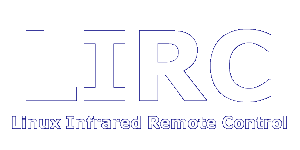

| |
FAQThere are various sources of information you should check before writing mails directly to me. Please read the LIRC homepage carefully and have a look at the FAQ. If your question is not answered there try the LIRC mailing list. Before posting to the list check the mailing list archive for an answer. Reporting bugsIf you believe that you have found a bug in LIRC your bug report should contain the following information:
If you have problems with one of the TV card drivers you should write to the according authors directly. You will find their email addresses in the source code and at the developers page. Adding new remote controls
The following description was written having receivers in mind
that deliver IR signals as pulses and spaces. So some of this
will not be relevant for receivers that work at a higher
abstraction layer as
There already is a growing database of config files for remote
controls available at the LIRC homepage. But if your remote
control is not available yet you can use irrecord to
create a config file for your remote control. If you want to
use more than one remote control you have to create a separate
file for each remote. If your remote control is able to control
different devices it is often wise to create separate config
files for each functional unit of the remote control. You can
later use a single config file for lircd by simply
merging the config files with Before using irrecord you should start mode2 and have a look at the signals that your receiver supplies. If you can see random pulses without pushing any buttons of your remote control your receiver is picking up ambient light. So if your receiver has no ambient light filter try to add one. A good strategy might also be to create a config file in a dark room and to turn off all fluorescent lamps or any other devices that may cause IR noise. If decoding of IR commands does not work reliably you can try to modify the eps and aeps values in the lircd config file to adjust the tolerance of signal lengths. aeps is an absolute value while eps is a relative value expressed in percent. Also if repeats do not work you should complain. I.e. if you hold down a button the output of irw should look like this. 0000000000f40bf0 00 1_DOWN ANIMAX 0000000000f40bf0 01 1_DOWN ANIMAX 0000000000f40bf0 02 1_DOWN ANIMAX 0000000000f40bf0 03 1_DOWN ANIMAX 0000000000f40bf0 04 1_DOWN ANIMAX 0000000000f40bf0 05 1_DOWN ANIMAX Note how the second field gets incremented. Many people don't even notice if this does not work correctly.
If you want to use a config file to send IR commands you should
try to vary the modulation frequency of the signals. The default
frequency is
frequency <freq>
to the according section of the config file where freq stands for the modulation frequency in Hertz. Usually values from 34000 to 44000 are good choices. As creating new config files is difficult sometimes and irrecord often cannot detect all features of the remote control please send new config files to lirc@bartelmus.de. Other people will appreciate this very much. Sometimes they cannot create such a config file themselves because their original remote control is broken or has been lost. Some devices that are capable of IR come without a remote control. Some people also only want to build a transmitter and if you make a config file available for them they won't need to build a receiver, too. Please add all information you can get concerning the remote control as a comment to the config file. If you still have difficulties to create a working config file send the following information to lirc@bartelmus.de:
I won't be able to answer any emails that do not contain the necessary information! The LIRC Manual, last update: 24-May-2009 |
|